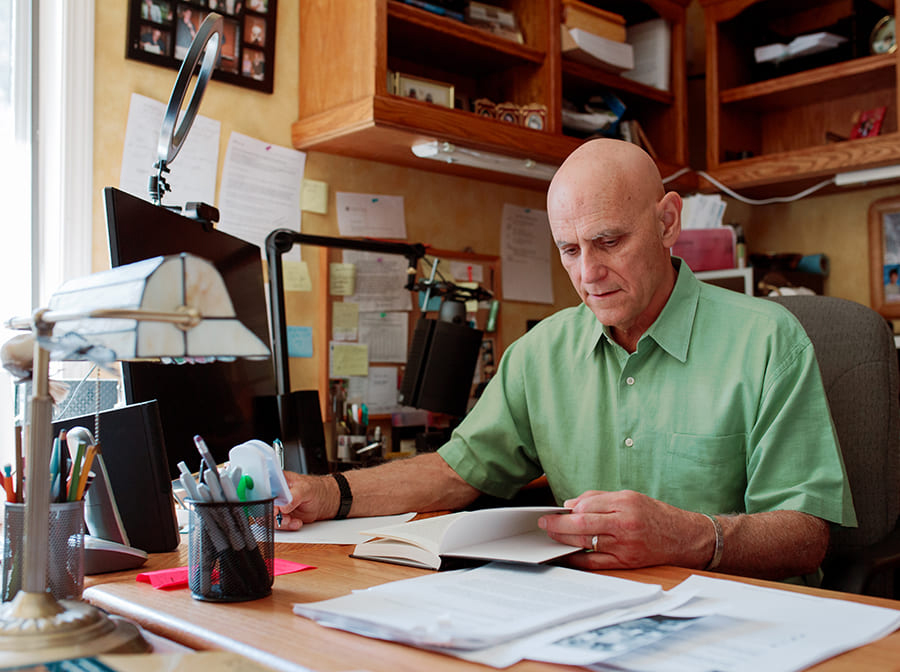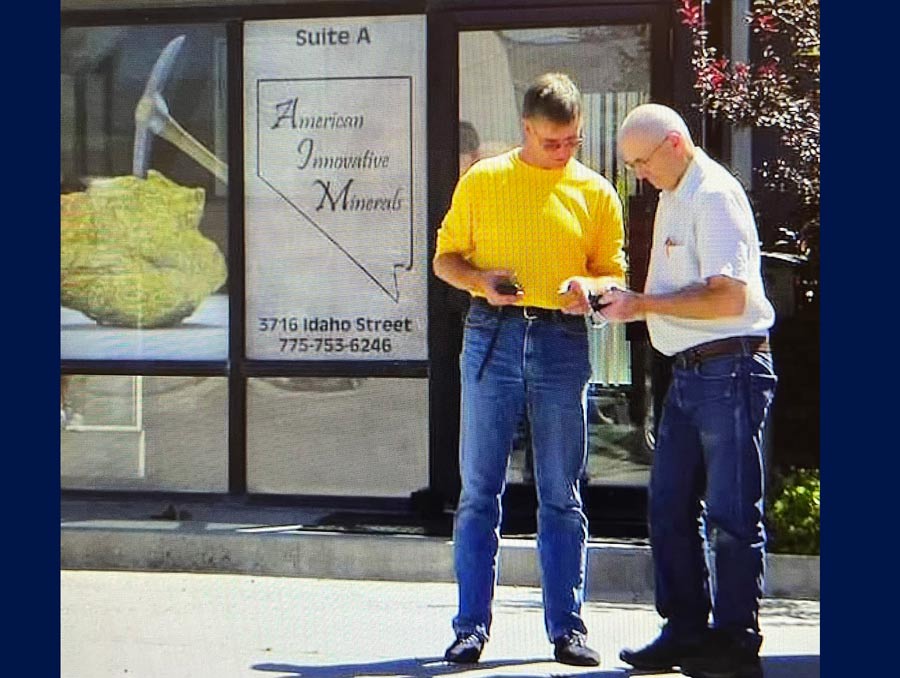Foundation Professor Steven Hayes, who has brought national and international recognition to the University of Nevada, Reno over the last three decades, has been awarded the 2022 Regents' Career Distinguished Researcher Award by the Nevada System of Higher Education Board of Regents.
Hayes came to the University as Professor and Director of Clinical Training for the Department of Psychology in 1986. He is now in the Behavioral Analysis program in the Department of Psychology in the College of Science. He has had an illustrious career focusing on an analysis of the nature of human language and cognition and its application to the understanding and alleviation of human suffering.
"His renown is arguably unparalleled in psychology," Katherine McCall, acting dean of the College of Science said. "His Distinguished Researcher Award is well-deserved. His research has indelibly changed the field of psychology and his teaching has inspired a new generation of psychologists. Most major programs in the country now include at least one of the over 50 doctoral degree recipients he mentored."
Hayes was a founder of the Association for Contextual Behavioral Science and is known internationally for the development of Acceptance and Commitment Therapy, an evidence-based form of psychotherapy.
In his almost 36 years at the University of Nevada, Reno he has also developed Relational Frame Theory, an account of human higher cognition that is used around the world in language acquisition and education. ACT, which is based on RFT, uses acceptance, mindfulness, and values-based methods to create more psychological flexibility. It is used for problems in mental and behavioral health and social wellness.
ACT self-help has been studied by the World Health Organization with South Sudanese and Syrian refugees and its positive impact has recently led WHO to distribute ACT in 18 different languages for a range of issues, including dealing with the stress of the COVID pandemic.
As a public educator about psychological science and its application, Hayes's blogs and TEDx talks have been read or viewed by more than three million people. More than 900 randomized control trials and thousands of studies of other kinds have been conducted on ACT and it has been recognized as a useful evidence-based intervention by scientific review councils around the world such as the Center for Disease Control and WHO.
Special Honor
"In the context of the many wonderful faculty members across the entire state, it's a special honor to receive this award because it covers all of the institutions in the Nevada System of Higher Education, and all of their Departments and programs," Hayes said. "But UNR faculty do not do research or teach or supervise to win awards. We do it to serve the citizens of our state and humanity more generally.
"I try to remember that people who work at minimum wage jobs are among those who pay the taxes that help fund a place like UNR. One of the first things I always tell students in my classes is that I'm an employee. I work for them and for the taxpayers and I ask them to kick my rear end if I ever come up short in delivering on what they should expect."
The Distinguished Researcher award is bestowed upon faculty members with a substantial record of accomplishments, including a significant amount of research and scholarly work with recognition, clear evidence of the national and/or international stature of the research.
“On behalf of the Department of Psychology, I congratulate Steve Hayes for being chosen to receive the Regents Career Distinguished Researcher of the Year award," Michael Crognale, professor in the Cognitive and Brian Sciences Program and the chair of the department, said. "Steve has been a major pillar of the psychology department for many years. He has long been the face of our internationally recognized Clinical Program and was instrumental in the creation and success of our celebrated Behavior Analysis program, as well.
"This award is particularly well-deserved and celebrates his remarkable record of important academic accomplishments and his tireless service to the department and the University. However, it is the consistency of his contributions that is truly remarkable."
Hayes's work has been recognized by several scientific awards including the Impact of Science on Application award from the Society for the Advancement of Behavior Analysis, and the Lifetime Achievement Award from the Association for Behavioral and Cognitive Therapy.
Recruited to the University
Hayes received his doctorate in Clinical Psychology from West Virginia University in 1977. When he was recruited to come to the University in 1986 it was as the Director of Clinical Training in the doctoral program on Clinical Psychology. He is now full time in behavior analysis.
"I was recruited because President Joe Crowley had recently announced in his "State of the University" address his intention to develop the University into a research-oriented University," Hayes said. "At the time, Psychology was one of only two or three doctoral programs on campus. It had been the first, and within psychology, clinical was by far the most active, so it was a logical place to start.
"The clinical program at the time, I think it was fair to say, did not share Crowley's vision. I knew that, but came anyway because a friend – the late Willard Day, who was in what was then called the experimental psychology program, encouraged me to come. In addition, my brother lived here, the major psychology departments across the country who offered me jobs all seemed to be fighting constantly, and I was a California boy yearning to get back west. I thought that I could somehow help turn Clinical Psychology into a research-oriented program, as part of a university that was learning to do the same.
"People have little idea of what a bold idea it was for Crowley to make that declaration for the University to become a research University."
Hayes recalls his early times at the University with fondness, and recounts it with a few stories. When he arrived on campus his brother, Greg Hayes, held a party for him. His brother is a medical doctor with a degree in public health who at the time was the county health director of nearby Alpine County, Calif. and later became a successful faculty member in the University's Department of Health Ecology and would eventually help start the UNR School of Public Health.
"At the party when I explained why I came to the University, the local attendees had such a strong reaction, it was seared into my brain," Hayes said. "Good thing I'd already signed my contract. After hearing my explanation one of Greg's friends said, incredulously and with a slight note of derision 'the little College on the hill!? A research university?!' Then the whole room laughed.
"I could understand the laughter. In the preceding decade none of tenured faculty members in the clinical psychology program (other than a recently retired person, the late Paul McReynolds) had a research publication, nor did the doctoral students. Trying to build a research-oriented program from a base publication rate of zero is something to chuckle about.
"It was not that the existing faculty were dead wood. Not at all. They were hard working and cared about their students. All of them used to be research active – some even had citation classics in their record – but they had come to UNR because they were committed to practical clinical training, and they came to avoid the dog-eat-dog world of 'publish until you drop' clinical programs in major research universities that they had each escaped.
"I was as committed as they were to clinical training and I promised them I would not let that training be weakened one bit, nor to turn our clinical program into a mindless research mill. My first act as Director was to eliminate an existing dispensation from having a clinical supervision team if faculty members were publishing.
"Instead, I tried in my own supervision and research to show how data could emerge from clinical practice itself. My philosophy was 'inspire, don't require.' I set up the first vertically integrated research team in the program (at the time, faculty were trying to produce research using an Oxford/Cambridge model of individual meetings with graduate students).
"Beer and behaviorism"
"I set up a research fair; a "beer and behaviorism" evening emerged; regular student/faculty meetings with discussion of research and well as clinical issues were started. In the clinical program the faculty all eventually decided to pitch in and help with a needed transition. I will go to my grave grateful to each one of the existing faculty members: Bob Peterson, Duane Varble, and Jim Mikawa. Ever so gradually the ship took a new direction and they help in that transition."
The Department established a program in behavior analysis, funded by applied programs (not initially by tenured lines) and his now ex-wife, Linda Hayes, "willed" it into existence, Hayes said.
"Very solid faculty members began to be hired in what was then called experimental psychology as well as in clinical and behavior analysis," he said. "Every single one of the clinical faculty members who were here when I was hired gradually began to have fun doing research again – all of them formed research teams, all of them graduated research-oriented students. All of them were empirically productive before they retired.
"That is one of the things I most appreciated about my time at UNR – the wonderful human beings who were already here on campus in every nook and cranny, including in Psychology."
After Hayes served seven years as Director of Clinical Training, Jerry Ginsburg stepped down as Chair of the department, and Hayes began a decade long run as Chair of the Department of Psychology from 1993 to 2002.
"Major grants started to flow, including several into my own lab," he said. "Psychology was routinely listed as among the strongest doctoral programs in the University by national science agencies. Every year our Department would compete with Biology, Physics, and Chemistry in the old College of Arts and Sciences College for who could bring in the most outside funding.
"Progress was not always smooth. I stepped down as Chair of Psychology when Arts and Sciences was split in two 20 years ago – creating problems we did not solve until we finally entered the College of Science in 2018."
Stepping down from administration proved to have a far-reaching impact, setting the stage for his accomplishments that now include authoring 47 books, more than 675 scientific articles and regularly conducting lectures at conferences around the world. According to Google Scholar, his citations number over 112,000 and his h-index is 147.
"With the burden of administration off of my shoulders over the last 20 years, I've put my full effort into my research program and a worldwide community that came to be interested in it. My research program was already getting attention when I stepped down as chair, but its visibility has gone into hyperdrive over the last two decades due to a combination of luck, great doctoral students, and colleagues around the world who have advanced this line of work. I think that is what this award most recognizes, and it has been an incredible ride.
"Crowley's dream eventually became a reality because my little story in my little corner of the "little College on the hill" was retold in area after area on campus from academic departments to student service," Hayes said. "Indeed, my wife, Jacqueline Pistorello, is perhaps the best grant writer I ever met and currently has an enormous multi-site federal grant focused on treating suicidality in students -- and she is in student services (she is the former director of Counseling Services) not an academic department. UNR can attract people like that.
"My 36 years have seen the role of the University change in the life of the community and state. We are leading, developing, and testing. Teaching is a big part of that, but research is at the center. It was an amazing transition and it continues to the present day."
The University in the 1980s was like a small town and people helped each other, Hayes recalled.
"At its best, that quality still defines the campus," he said. "There are not many institutions of higher education in the United States have transitioned more dramatically into a research focused institution in a short period of time than our own."
Keynote Address on Campus
In a recent keynote presentation for the University's Wellness week program, he walked the participants through what the skills of psychological flexibility are and why they matter. Those same principles were adopted by the World Health Organization that, based on results from several massive randomized trials, now distributes a free self-help program worldwide in 21 languages based on the psychological flexibility methods he developed here at the University, and they recommend this approach for “anyone who experiences stress, wherever they live, and whatever their circumstances."
"This program is the only “fully scalable” psychological intervention WHO offers," Hayes said. "And it is the only self-help program they offer for survivors of war, after finding in their own studies that my methods both treat and prevent problems across the full range of psychological and behavioral health areas. I've had a lot of cool things happen in my academic life -- and they are continuing -- but that one is special."
His popular book Get Out of Your Mind and Into Your Life was featured in Time Magazine among several other major media outlets and for a time was the best-selling self-help book in the United States, and his new popular book, A Liberated Mind, has been released to wide acclaim. Hayes served a 5-year term on the National Advisory Council for Drug Abuse in the National Institutes of Health and is a Fellow of several scientific societies including the American Association for the Advancement of Science.
A recipient of approximately $13 million in grant funding while at the University, Hayes is the most cited scholar in any area in the state of Nevada and Google Scholar data ranks him among the top 1,100 most cited scholars in the world.
With all of these accolades, Hayes nevertheless said his single most rewarding experience has been his own doctoral graduate students.
"I am on course to retire next year having produced 49 Ph.Ds. here at UNR," he said. "I am proud to say that is the most ever in the entire state – and by a significant margin (and I graduated 7 before I came here so I will have 56 Ph.Ds. overall).
"I'm happy to say I'm genuinely proud of every single one. They all left with science values in addition to their practical commitments – and their careers have represented that combination. Having doctoral students is like having kids – you admit them to train them so that they can leave and make a difference.
"In my opinion, they all have. And that is the most rewarding thing of having a career like the one I have had.
"In some ways they have helped change psychology and behavior analysis through their work and those of their students and even the students of their students (yes, I have a number of intellectual great grandchildren!). A few are now deceased, but I've maintained contact with all of my living doctoral graduates. My career has received a lot of attention but really the reason is not me – it's my students."
Hayes set an example for his students in many ways, and being accountable is just one. His graduate students know if they turn in a draft of a research project, they will either get it back within two weeks or he fines himself $100 a day until they get it back.
"I've tried to hold myself accountable to my students because that is part of how I hold myself accountable to those citizens I will never meet who paid me to do something useful for them," he said. "I hope in some small way when they need psychological empowerment that their lives can be better because of my lab, program, department, school and University."
Hayes won the mid-career version of the Distinguished Researcher Award a bit more than two decades ago.
"Now, as I glide into retirement, I've won the career version of it," he said. "It's sweet to be facing retirement with an acknowledgment that maybe, just maybe, I've taken advantage of this amazing opportunity the University has given me to explore, to teach, and to learn."
Additional Major Awards, Achievements and Accomplishments
Hayes is a Fellow of the American Association for the Advancement of Science (AAAS) who among other awards has received the Impact of Science on Application Award from the Society for the Advancement of Behavior Analysis; the Don F. Hake Award for Exemplary Contributions to Basic Behavioral Research and Its Applications from the American Psychological Association; and the Lifetime Achievement Award from the Association for Behavioral and Cognitive Therapies. A UNR Foundation Professor since 1992, in 1997 he was the University of Nevada, Reno Outstanding Researcher of the Year; in 2000 he received the NSHE mid-career Regents' Researcher of the Year Award. In 1992 he was listed by the Institute for Scientific Information as the 30th "highest impact" psychologist in the world.
Hayes has been President of Division 25 of the APA, of the American Association of Applied and Preventive Psychology, the Association for Behavioral and Cognitive Therapies, and the Association for Contextual Behavioral Science. He was the first Secretary-Treasurer of the Association for Psychological Science, which he helped form and has served a 5-year term on the National Advisory Council for Drug Abuse in the National Institutes of Health.
















